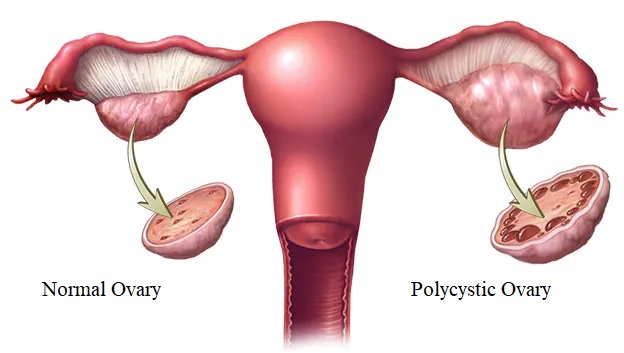Apr 18, 2025
Apr 18, 2025
Polycystic Ovarian Disease is a medical condition affecting the ovulation process in the menstrual cycle. The main cause for PCOD is due to hormonal imbalance causing the formation of multiple cysts inside the ovary resulting in irregular menstrual bleeding and infertility. The unhealthy lifestyle followed by youngsters nowadays is observed to be the primary reason for PCOS. The hormone imbalance due to lack of physical activities triggers the problem, leading to multiple cysts.

Causes for Polycystic Ovarian Disease
Hormonal imbalance remains the major cause of PCOD. The inactive lifestyle followed due to busy work schedules, genetic conditions, obesity, sleep apnea, and cardiovascular diseases are the other major causes of PCOD. Ayurvedic treatment for PCOD will depend on the cause of the disease.
PCOD AND PCOS
People often the terms Polycystic Ovarian Disorder (PCOD) and Polycystic Ovarian Disorder (PCOS) interchangeably. They are connected, in that they are associated with the ovaries and are causal factors of infertility. However, in PCOS, the ovaries produce unusual levels of androgens, which increase testosterone levels, leading to hirsutism. They affect healthy egg development as well. Some of the eggs become liquid-filled sacs, or cysts, which build up in the ovaries and may even, get enlarged. In PCOD, mature eggs do not get discharged and collect in the ovaries due to hormonal imbalances. These imbalances affect follicular growth during the ovarian cycle, causing the affected follicles to remain in the ovary. When the follicles do not mature, ovulation does not take place.
AYURVEDA DESCRIBES PCOD
Ayurveda attributes the disruption in healthy ovulation to Kapha and Vata Dosha imbalances. Akasha Mahabhuta, or Space, is represented in the female body by the hollow space of the reproductive cavity. During the ovarian cycle, Vata is responsible for follicular movement, the rupture of the ovarian wall releasing the matured ovum; and the movement of fimbriae, or the finger-like projections that guide the ovum through the fallopian tubes and into the uterus. Kapha provides nourishment for the uterus, aids follicular growth, and the development of (a fertilised) egg into a foetus. According to Ayurveda, what we understand as hormones, represent the ‘fire’ elements of human tissue, and therefore, PittaDosha, which stands for transformation; in the way that Vata stands for mobility, and Kapha for consolidation and ‘security.’
The ‘cold and sticky’ qualities of an imbalanced Kapha affect digestive fire, or agni, which in turn affects the metabolic rates of the tissues, or dhatus. The dhatus affected in PCOD are rasa dhatu (lymph and plasma), medha dhatu (adipose tissue) and artava dhatu (the female reproductive system).
LIFESTYLE IMPROVEMENTS FOR PCOD
PHYSICAL FITNESS
It is absolutely necessary to include some form of exercise, sports, or general physical activity into your daily routine, even if for 15-20 minutes. Regular exercise burns calories and helps reduce the uncharacteristic weight gain that is often associated with PCOD, but it also helps stabilise the metabolic rates of the body, which will in turn help stabilise the imbalanced Doshas that aggravate PCOD.
DIETARY CHANGES
Dense foods, like breads, pastas, puddings, deep-fried foods and hard cheeses should be avoided. Warm foods would also include those flavoured with pungent, bitter or astringent spices, such as chillies, cardamom, cloves, ginger, garlic or turmeric
CHANGE OF PACE – TRY TO RELAX
Women suffering from PCOD, or PCOS are prone to frequent mood swings, depression and also emotional eating – which further aggravates the ‘slow-moving’ quality of Kapha's digestive processes. It is important to adopt a bright, happy and optimistic view on life, especially as living with delicate gynaecological problems can consciously or subconsciously affect confidence and self-esteem. Try to keep aside time for meditation and deep-breathing exercises, or any hobbies that you may be particularly passionate about.
Ayurvedic Treatment for PCOD
The Ayurvedic approach to treat PCOD reflects the regulation of rasa and Rakta Dhatus, which means cleansing the body vital systems. With the modern lifestyle and highly stressed environment, the levels of impurities and toxins in the body are high which can cause the formation of cyst in the ovaries. Imbalance in hormone levels is rectified by removing the toxins and impurities from the body by balancing all three doshas in the body. Along with ayurvedic treatment, few lifestyle modifications have to be adopted to produce effective results. From an Ayurvedic perspective, excessive consumption of contraceptive pills, mental stress, and lack of physical activity can produce toxins in the body and cause diseases like PCOS.
25-Dec-2021
More by : Dr. Shiv Dwivedi